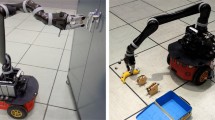Abstract
We present a framework that, given a set of skills a robot can perform, abstracts sensor data into symbols that are used to automatically encode the robot’s capabilities in Linear Temporal Logic (LTL). We specify reactive high-level tasks based on these capabilities, for which a strategy is automatically synthesized and executed on the robot, if the task is feasible. If a task is not feasible given the robot’s capabilities, our framework automatically suggests additional skills for the robot that would make the task feasible. We demonstrate our framework on a Baxter robot manipulating blocks on a table.
Access this chapter
Tax calculation will be finalised at checkout
Purchases are for personal use only
Similar content being viewed by others
Notes
- 1.
Note that \(\sigma \) are only generated from effect sets in Konidaris et al. [1], future work will consider generating \(\sigma \) from precondition sets as well.
References
Konidaris, G., Kaelbling, L.P., Lozano-Perez, T.: From skills to symbols: learning symbolic representations for abstract high-level planning. J. Artif. Intell. Res. 61, 215–289 (2018). https://www.jair.org/index.php/jair/article/view/11175
Kress-Gazit, H., Lahijanian, M., Raman, V.: Synthesis for robots: guarantees and feedback for robot behavior. Annu. Rev. Control Robot. Auton. Syst. 1, 211–236 (2018). https://www.annualreviews.org/doi/full/10.1146/annurev-control-060117-104838
Mazo, M., Davitian, A., Tabuada, P.: PESSOA: a tool for embedded controller synthesis. In: Touili, T., Cook, B., Jackson, P. (eds.) CAV 2010. LNCS, vol. 6174, pp. 566–569. Springer, Heidelberg (2010). https://doi.org/10.1007/978-3-642-14295-6_49
Finucane, C., Jing, G., Kress-Gazit, H.: LTLMoP: experimenting with language, Temporal Logic and robot control. In: IEEE/RSJ International Conference on Intelligent Robots and Systems (IROS), pp. 1988–1993 (2010)
He, K., Lahijanian, M., Kavraki, L., Moshe, V.: Automated abstraction of manipulation domains for cost-based reactive synthesis. IEEE Robot. Autom. Lett. (2018). https://ieeexplore.ieee.org/abstract/document/8585149
Fikes, R.E., Nilsson, N.J.: STRIPS: a new approach to the application of theorem proving to problem solving. Artif. Intell. 2(3–4), 189–208 (1971). https://www.sciencedirect.com/science/article/pii/0004370271900105
Fox, M., Long, D.: PDDL2. 1: an extension to PDDL for expressing temporal planning domains. J. Artif. Intell. Res. 20, 61–124 (2003). https://www.jair.org/index.php/jair/article/view/10352
Ghallab, M., Nau, D., Traverso, P.: Automated Planning and Acting. Cambridge University Press, New York (2016)
Yoon, S., Fern, A., Givan, R.: FF-Replan: a baseline for probabilistic planning. In: ICAPS, no. 7, pp. 352–359 (2007). https://www.aaai.org/Papers/ICAPS/2007/ICAPS07-045.pdf
Lahijanian, M., Andersson, S.B., Belta, C.: Temporal logic motion planning and control with probabilistic satisfaction guarantees. IEEE Trans. Rob. 28(2), 396–409 (2012). https://ieeexplore.ieee.org/abstract/document/6085615
Wongpiromsarn, T., Topcu, U., Murray, R.M.: Receding horizon control for temporal logic specifications. In: Proceedings of the 13th ACM International Conference on Hybrid Systems: Computation and Control, pp. 101–110. ACM (2010). https://dl.acm.org/citation.cfm?id=1755968
DeCastro, J.A., Kress-Gazit, H.: Nonlinear controller synthesis and automatic workspace partitioning for reactive high-level behaviors. In: Proceedings of the 19th International Conference on Hybrid Systems: Computation and Control, pp. 225–234. ACM (2016). https://dl.acm.org/citation.cfm?id=2883832
Kress-Gazit, H., Fainekos, G.E., Pappas, G.J.: Temporal-logic-based reactive mission and motion planning. IEEE Trans. Rob. 25(6), 1370–1381 (2009). https://ieeexplore.ieee.org/abstract/document/5238617
He, K., Wells, A., Kavraki, L.E., Vardi, M.Y.: Efficient symbolic reactive synthesis for finite-horizon tasks, pp. 8993–8999 (2019)
Raman, V., Kress-Gazit, H.: Explaining impossible high-level robot behaviors. IEEE Trans. Rob. 29(1), 94–104 (2013). https://ieeexplore.ieee.org/abstract/document/6301745/
Chatterjee, K., Henzinger, T.A., Jobstmann, B.: Environment assumptions for synthesis. In: van Breugel, F., Chechik, M. (eds.) CONCUR 2008. LNCS, vol. 5201, pp. 147–161. Springer, Heidelberg (2008). https://doi.org/10.1007/978-3-540-85361-9_14
Könighofer, R., Hofferek, G., Bloem, R.: Debugging formal specifications using simple counterstrategies. In: Formal Methods in Computer-Aided Design, pp. 152–159. IEEE (2009). https://ieeexplore.ieee.org/abstract/document/5351127
Alur, R., Moarref, S., Topcu, U.: Counter-strategy guided refinement of GR (1) temporal logic specifications. In: Formal Methods in Computer-Aided Design, pp. 26–33. IEEE (2013). https://ieeexplore.ieee.org/abstract/document/6679387
Li, W., Dworkin, L., Seshia, S.A.: Mining assumptions for synthesis. In: Proceedings of the Ninth ACM/IEEE International Conference on Formal Methods and Models for Codesign, pp. 43–50. IEEE Computer Society (2011). https://dl.acm.org/citation.cfm?id=3041637
Hollander, M., Wolfe, D.A., Chicken, E.: Nonparametric Statistical Methods, 3rd edn. Wiley, Chichester (2014)
Pnueli, A.: The temporal logic of programs. In: 18th Annual Symposium on Foundations of Computer Science, pp. 46–57. IEEE (1977). https://ieeexplore.ieee.org/abstract/document/4567924
Bloem, R., Jobstmann, B., Piterman, N., Pnueli, A., Saar, Y.: Synthesis of reactive (1) designs. J. Comput. Syst. Sci. 78(3), 911–938 (2012). https://www.sciencedirect.com/science/article/pii/S0022000011000869
Ehlers, R., Raman, V.: Slugs: extensible GR (1) synthesis. In: Chaudhuri, S., Farzan, A. (eds.) CAV 2016. LNCS, vol. 9780, pp. 333–339. Springer, Cham (2016). https://doi.org/10.1007/978-3-319-41540-6_18
Ghallab, M., Nau, D., Traverso, P.: Automated Planning: Theory and Practice. Elsevier, Amsterdam (2004)
Olson, E.: AprilTag: a robust and flexible visual fiducial system. In: International Conference on Robotics and Automation (ICRA), pp. 3400–3407. IEEE (2011). https://ieeexplore.ieee.org/abstract/document/5979561
Sucan, I.A., Chitta, S.: Moveit! http://moveit.ros.org
James, S., Rosman, B., Konidaris, G.: Learning to plan with portable symbols. In: ICML/IJCAI/AAMAS 2018 Workshop on Planning and Learning (2018). https://www.benjaminrosman.com/papers/pal18.pdf
Acknowledgments
This work is supported by the ONR PERISCOPE MURI award N00014-17-1-2699.
Author information
Authors and Affiliations
Corresponding author
Editor information
Editors and Affiliations
1 Electronic supplementary material
Below is the link to the electronic supplementary material.
Rights and permissions
Copyright information
© 2022 The Author(s), under exclusive license to Springer Nature Switzerland AG
About this paper
Cite this paper
Pacheck, A., Konidaris, G., Kress-Gazit, H. (2022). Automatic Encoding and Repair of Reactive High-Level Tasks with Learned Abstract Representations. In: Asfour, T., Yoshida, E., Park, J., Christensen, H., Khatib, O. (eds) Robotics Research. ISRR 2019. Springer Proceedings in Advanced Robotics, vol 20. Springer, Cham. https://doi.org/10.1007/978-3-030-95459-8_31
Download citation
DOI: https://doi.org/10.1007/978-3-030-95459-8_31
Published:
Publisher Name: Springer, Cham
Print ISBN: 978-3-030-95458-1
Online ISBN: 978-3-030-95459-8
eBook Packages: Intelligent Technologies and RoboticsIntelligent Technologies and Robotics (R0)




